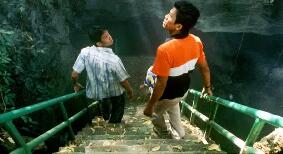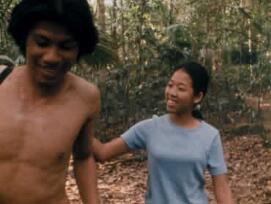Once Upon a Time, In the Woods: Apichatpong Weerasethakul's Films Tropical Malady and Blissfully Yours
by dave heaton
 The feature films of Apichatpong Weerasethakul - a Thai director who once studied experimental film at the Art Institute of Chicago - each traverse boundary lines and work towards making them disappear...the lines between documentary and fiction, professional and amateur, pop culture and art, drama and melodrama. Weerasethakul's interest in storytelling played a central role in his first feature-length film Mysterious Object at Noon, an experimental documentary in which Thai villagers collectively create a story while others act it out. That film neatly combines a playful sort of experimentation with an appreciation for the stories people create, tell and pass on. Narrative storytelling and the avant garde are brought together in Weerasethakul's newest film, the fictional feature Tropical Malady, as well, yet in a much different, more overtly surprising way. The first half of the film tells a story in a seemingly straightforward way, but with hints of mystery; as the film continues it shifts towards ambiguity and obscurity, yet in a way that echoes interestingly with the original story.
The feature films of Apichatpong Weerasethakul - a Thai director who once studied experimental film at the Art Institute of Chicago - each traverse boundary lines and work towards making them disappear...the lines between documentary and fiction, professional and amateur, pop culture and art, drama and melodrama. Weerasethakul's interest in storytelling played a central role in his first feature-length film Mysterious Object at Noon, an experimental documentary in which Thai villagers collectively create a story while others act it out. That film neatly combines a playful sort of experimentation with an appreciation for the stories people create, tell and pass on. Narrative storytelling and the avant garde are brought together in Weerasethakul's newest film, the fictional feature Tropical Malady, as well, yet in a much different, more overtly surprising way. The first half of the film tells a story in a seemingly straightforward way, but with hints of mystery; as the film continues it shifts towards ambiguity and obscurity, yet in a way that echoes interestingly with the original story.
The first half of Tropical Malady is a gentle, amiable love story between a delivery truck driver from the country (Sakda Kaewbuadee) and a solider from the city (Banlop Lomnoi). On the surface this is conventional storytelling and filmmaking, yet there's continually hints at mysterious feelings and happenings beneath the surface, from the appearance at the beginning of a man wandering naked in the woods to the way that the camera lingers on faces, bringing to our attention looks and expressions that remind us of the thoughts people have that are never expressed and the way that one human being can never fully understand another.
The second half of the film begins with the phrase, "Once upon a time..." before switching focus completely, to a mythic tale of a creature (a ghost, perhaps, or a tiger) who is on the prowl in the jungle, killing livestock and people. A soldier is sent to find the creature, and we follow him on his journey. The soldier is played by Banlop Lomnoi, who played the lover/soldier in the first half of the film, and the ghost/tiger is at times played by Sakda Kaewbuadee, the soldier's lover from the first half. The tale thus echoes the first story even as it doesn't explicitly present itself as a continuation of the same story. From this point on, Tropical Malady gets continually stranger, more confusing and harder to pin down. And the more mysterious it gets, the more it has you contemplating what was really going on in the first half of the story - in this way Tropical Malady takes the theme of the unknowability of people and the indefinable nature of our deepest emotions and instincts...and explores it through ambiguous storytelling and filmmaking. The second half of the film's hard-to-define nature is not just confusing, it's exciting, especially given the way that its tale mysteriously echoes elements of the first. Tropical Malady is thus an adventure ride that's filled with a multitude of interesting ideas and emotional undercurrents. The film is ultimately exhilarating, leaving you with a headful of questions and the realization that the film is tapping into reactions and feelings that are complex yet impossible to capture.
 In Tropical Malady, the jungle is a place of darkness and mystery, used to illuminate the darkness and mysteries lurking beneath the surface of human beings. In his film before this one, Apichatpong Weerasethakul used a similar environment in a much different way. In Blissfully Yours the forested landscape is just as entrancing and evocative, yet it's a place where the main characters go to escape from the harsh realities of daily life. Unlike Mysterious Object at Noon, Blissfully Yours is a work of fiction, yet it furthers Weerasethakul's interest in blurring the line between fiction and realism by using non-professional actors and a real-life setting (the forested mountains along the Burma/Thailand border) and context (the political turmoil between the two countries) in its plot (a young Thai woman and her Burmese boyfriend escape economic and personal struggles by vacationing).
In Tropical Malady, the jungle is a place of darkness and mystery, used to illuminate the darkness and mysteries lurking beneath the surface of human beings. In his film before this one, Apichatpong Weerasethakul used a similar environment in a much different way. In Blissfully Yours the forested landscape is just as entrancing and evocative, yet it's a place where the main characters go to escape from the harsh realities of daily life. Unlike Mysterious Object at Noon, Blissfully Yours is a work of fiction, yet it furthers Weerasethakul's interest in blurring the line between fiction and realism by using non-professional actors and a real-life setting (the forested mountains along the Burma/Thailand border) and context (the political turmoil between the two countries) in its plot (a young Thai woman and her Burmese boyfriend escape economic and personal struggles by vacationing).
Blissfully Yours has next-to-no plot: After an introduction to the characters and their lives, we essentially spend time with the characters in the forest, as they relax, eat, make love, hike and talk. (The transition between the introduction and the vacation is marked by the film's belated opening credits, marking the film's title as representative of the feeling surrounding their trip to the forest). Yet over the course of the film a story is being told, almost without our knowing it. As the film unfolds we get a sense for what they're escaping along with the joys of that escape. Many frames of Blissfully Yours could exist as striking, gorgeous still photographs, and at times the film resembles a picture postcard in (slow) motion...yet there are deeper emotions lurking beneath the beauty. J. Hoberman of the Village Voice referred to the film as "unconscionably happy", but in fact the harshness and sadness of life are ever-present beneath the characters' moments of pleasure and happiness. Blissfully Yours and Tropical Malady on the surface represent different visions of the forest, and different styles of storytelling - but in actuality they have much in common, as both films pair happiness with darkness and look at the mysterious ways the two are intwined. Though Blissfully Yours is slow, patient, naturalistic and painterly while Tropical Malady has in its second half erratic and confounding moments galore, both films represent to me some of the most exciting filmmaking I have been exposed to in recent years. Both films are absolutely filled with ideas, emotions, and haunting images, and both are worthy of viewing by anyone willing to approach a film with an inquisitive and open mind.
{Note: I saw Tropical Malady as part of the New York Film Festival. It has shown at other film festivals as well, and won a special jury prize at the 2004 Cannes Film Festival. It will be released by Strand Releasing sometime in 2005. I saw Blissfully Yours during a one-week showing at Anthology Film Archives in New York City. It has shown at various film festivals over the last couple years; hopefully it will eventually see DVD release or continue to be shown in theaters. Weerasethakul's first film, Mysterious Object at Noon, is available on DVD from Plexifilm. For more information on all three films, visit the web site of Apichatpong Weerasethakul's production company, Kick the Machine. Also see my interview with him from April of 2003: http://www.erasingclouds.com/01april.html.}
Copyright (c) 2005 erasing clouds |
|